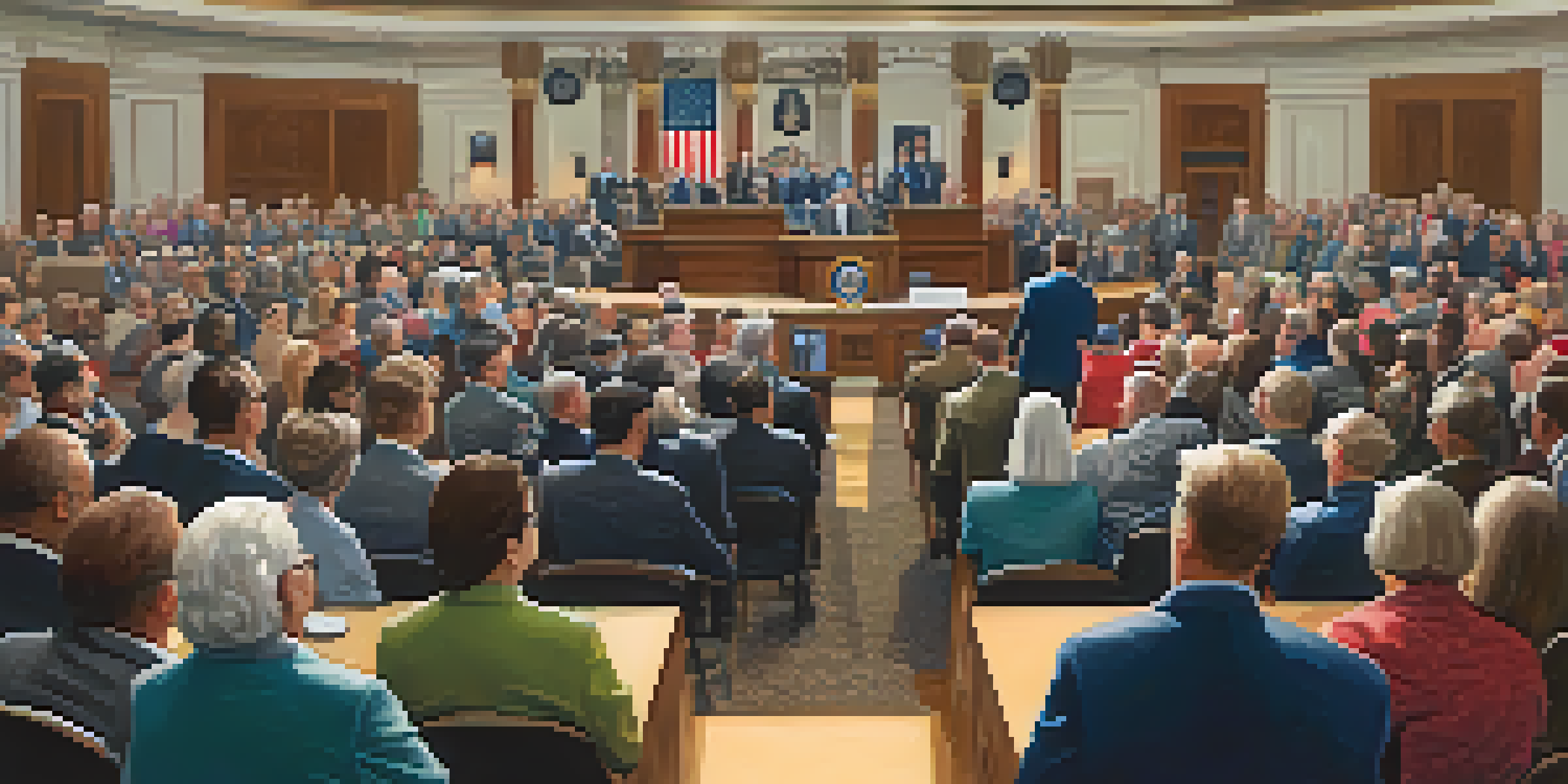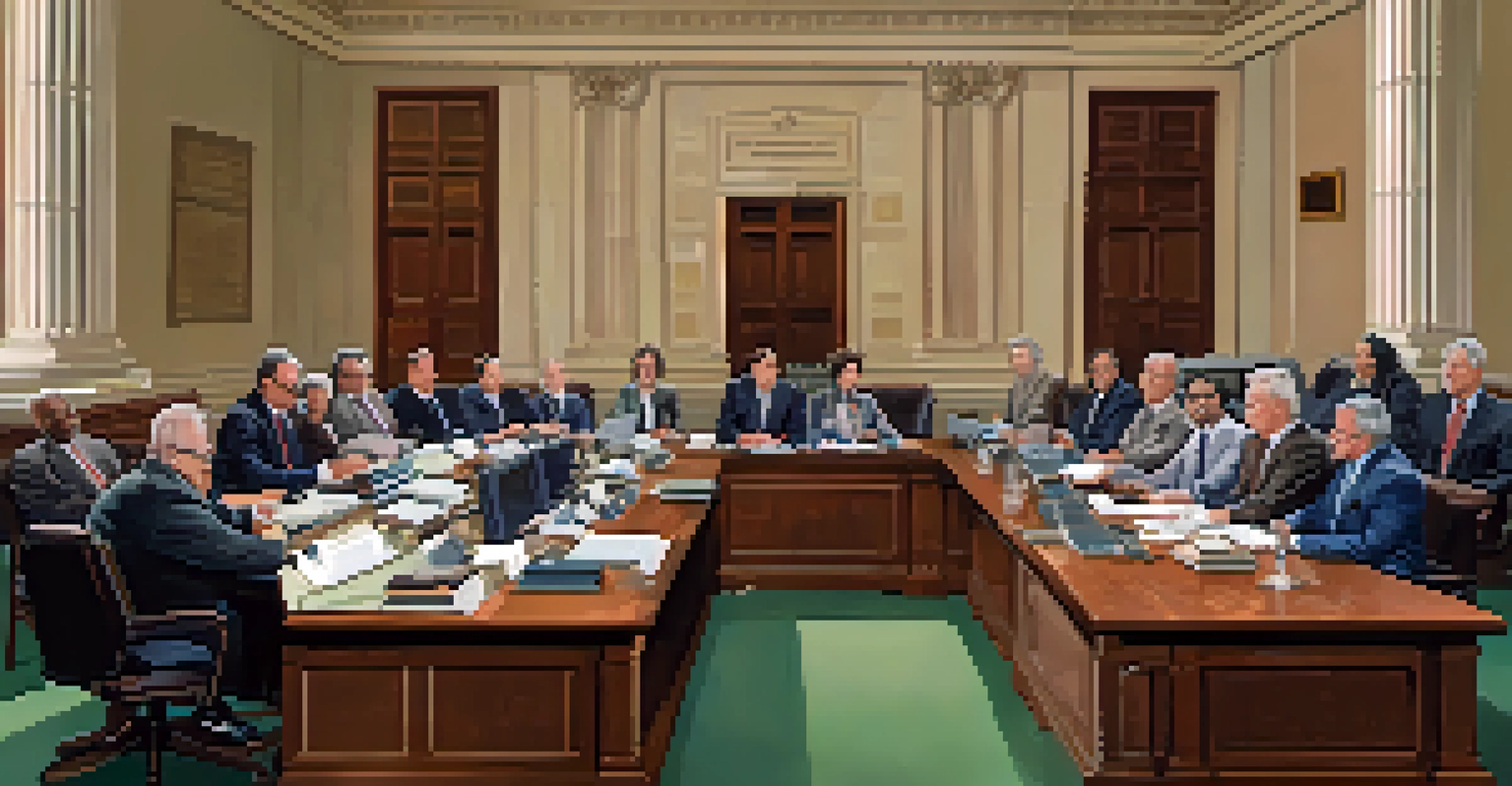The Role of the Missouri General Assembly in Legislation

Overview of the Missouri General Assembly's Structure
The Missouri General Assembly is the legislative body responsible for creating laws in the state. It consists of two chambers: the Senate and the House of Representatives. Each chamber plays a vital role in the legislative process, ensuring a thorough examination of proposed laws.
The law is the public conscience.
Senators serve four-year terms, while representatives serve two-year terms, allowing for a mix of experience and fresh perspectives. This structure promotes a balance of power and encourages collaboration across party lines, which is essential for effective governance.
With 34 senators and 163 representatives, the assembly reflects Missouri's diverse population. Each member represents a specific district, ensuring that local voices are heard in the legislative process.
How Legislation is Proposed in Missouri
Legislation in Missouri begins with the proposal of a bill, which can be introduced by any member of the General Assembly. This can stem from various sources, including constituents, interest groups, or even the governor's office. By allowing diverse inputs, the process ensures that a wide range of issues can be addressed.

Once a bill is proposed, it is assigned to a committee that specializes in the relevant subject matter. This committee reviews the bill, holds hearings, and can make amendments before voting on whether to send it to the full chamber for consideration.
Missouri's Legislative Structure
The Missouri General Assembly consists of the Senate and House of Representatives, balancing experience and fresh perspectives in lawmaking.
The committee stage is crucial, as it determines which bills advance in the legislative process. This is where the details are hashed out, making it a vital step in shaping effective legislation that meets the needs of Missourians.
The Legislative Process: From Bill to Law
After a bill passes through the committee, it moves to the floor of the chamber for debate and voting. Members discuss its merits, and amendments may be proposed to refine the legislation further. This stage is essential, as it allows for open dialogue and ensures that all viewpoints are considered.
In a democracy, the public has a right to know the workings of government, and the government has an obligation to provide that information.
If a bill receives majority support, it passes to the other chamber, where it undergoes a similar process. Both chambers must agree on the final version of the bill, which may involve negotiating compromises to satisfy different interests.
Once both chambers approve the bill, it is sent to the governor for signature. If signed, the bill becomes law; if vetoed, the General Assembly can attempt to override the veto with a two-thirds majority in both chambers.
The Role of Committees in the Legislative Process
Committees are the backbone of the legislative process in the Missouri General Assembly. They conduct in-depth reviews of bills, gather expert testimony, and hold public hearings to ensure diverse opinions are considered. This focused approach allows for more informed decision-making.
Each committee specializes in specific areas, such as education, health, or finance, enabling members to delve into the details of legislation. This specialization helps streamline the process by ensuring that the right experts are assessing the relevant issues.
Role of Committees in Legislation
Committees are essential for reviewing bills, gathering expert testimony, and refining legislation before it reaches the floor for debate.
By the time a bill reaches the floor for debate, it has often been significantly refined due to the committee's work. This enhances the quality of legislation and increases the likelihood of successful passage through the assembly.
The Importance of Public Input in Legislation
Public input is a crucial element of the legislative process in Missouri. It helps ensure that the voices of constituents are heard and considered when crafting laws. This engagement fosters transparency and accountability, as legislators are more likely to support measures that reflect the needs of their communities.
Public hearings and committee meetings allow citizens to express their opinions on proposed legislation directly. This can lead to valuable insights that lawmakers may not have considered, ultimately resulting in more effective and representative laws.
Encouraging citizen participation not only strengthens democracy but also builds trust between the General Assembly and the public. When residents feel their input matters, they're more likely to engage with the legislative process and advocate for their needs.
The Role of the Governor in Legislation
The governor of Missouri plays a pivotal role in the legislative process, particularly at the end of it. Once a bill has passed both chambers of the General Assembly, it is presented to the governor for approval. The governor can choose to sign the bill into law, veto it, or allow it to become law without signature.
A veto can prompt significant discussions within the assembly, as lawmakers may seek to override it. This requires a two-thirds majority vote in both chambers, reflecting the importance of consensus and collaboration in state governance.
Importance of Public Input
Public engagement in the legislative process fosters transparency and accountability, ensuring that community needs are reflected in new laws.
The governor can also influence legislation through their proposed budget and policy priorities. By highlighting certain issues, the governor can steer the General Assembly's focus toward specific areas of public concern.
The Impact of Legislation on Missouri Citizens
The laws passed by the Missouri General Assembly have a direct impact on the daily lives of citizens. From education and healthcare to infrastructure and public safety, legislation shapes the framework within which residents live and work. Understanding the assembly's role in this process is essential for informed civic engagement.
When citizens understand how laws are made, they can better advocate for changes that align with their needs. Engaging with their representatives and participating in public hearings can lead to more responsive governance.

Ultimately, effective legislation reflects the values and priorities of the community. By actively participating in the legislative process, Missourians can help shape a better future for their state and ensure that their voices are heard.